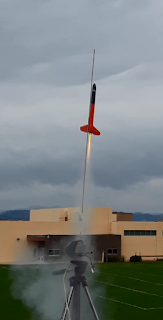Jim was heavily involved in model rocketry back in the 1960s - 70s, being a member of the North Royalton Rocket society (NAR section # 180) in Ohio. He later went on to become one of the founders of the well-known NAR section #337 - SNOAR (Suburban North Ohio Association of Rocketry).
Back in the day, Jim was big into competition rocketry (weren't we all?), having flown in NARAMs 14 and 17. He was reserve champ at the former. After joining the U.S Air Force, Jim later went on to become the Program Manager of the Delta II Space Launch program. Wow...now there's some credentials!
Anyway, Jim found me through this blog, established contact, and expressed an interest in getting together to launch.
After monitoring the local wind and weather websites, it was found that Labor Day might yield up some ideal flying weather in Castle Rock. The chosen site was the practice/soccer field complex attached to Douglas County High School, my favorite launch spot in the area.
We met at the field at 10 a.m. to find near perfect conditions: 75 degrees, high cloud cover, and wind speeds that ranged from dead calm to not more than 5 or 6 mph.
The field itself was in great shape, and we set up operations on one of the cement pads at the top of a slope mid-field.
I started the festivities off by launching my ol' Hornet for its 40th flight. The perennially reliable bird turned in yet another perfect performance on an A3-4T engine.

The next bird of the pad was Jim's first model rocket launch as a BAR. This honor went to his Alpha III, which also turned in a picture perfect A8-3 launch and recovery.

Following this was my newly built Alpha, also on A8-3 power. The model turned in a very nice flight, but as I was watching it come down on the parachute, I saw some object falling. It was the expended engine casing which had somehow ejected even with an engine holder in place. How did that happen? The casing landed a mere two feet from me.

A pair of battle-tested Old Fart BARS launching Alphas.
Go figure.
By now, Jim was starting to pull some more interesting birds from his model box....
....like a Pegasus 1/48 scale V-2 plastic conversion!

Sadly, I didn't get any launch pics of this one.
The model turned in a nice straight-up boost, but experienced some ejection issues that caused a less than perfect landing. Damage was minimal, and appeared repairable.

 Next model up was my new Satellite Interceptor for its maiden flight.
Next model up was my new Satellite Interceptor for its maiden flight.The model boosted nicely on a B6-4 engine.
The parachute ejected but did not open.
Fortunately, the falling model assumed a horizontal attitude during its descent and made a relatively soft landing on the turf.
No damage whatsoever.
The next model to be prepped and flown was Jim's very nice looking Ariane 4 plastic model conversion from the Heller 1/125 scale kit.
Upon ignition, the model boosted, arced over, and pranged a short distance from the launch pad.
The impact looked worse than it really was due to all of the removable booster pods detaching and separating.
Only one piece of the main rocket broke.
Jim determined that it can be repaired again to flying condition.
He surmised that the C6-3 engine used for the flight didn't provide enough airspeed to sustain stability.
He plans on modifying the model to fly on a D12.


Plastic model conversions can indeed be some of the trickiest model rockets to build and fly.
For the next flight, Jim prepped a very unusual looking device...
 This strange looking model is a Vortico by Rocketarium.
This strange looking model is a Vortico by Rocketarium.Essentially, it is constructed from pieces of plywood configured to exhibit a spinning flight.
The model boosted straight and high, spinning both on the way up and down.
Jim describes the model as
"Great fun, interesting to watch fly, small-field friendly, easy prep - it's a winner!"
He flew the bird twice - on a B6-0 and later with a C6-3.
Definitely a very cool model rocket!


Next up was my Estes Lynx on an A10-3T engine.
Again the model turned in its signature excellent performance, coming in for a soft landing mere feet from the launch pad!

After this, Jim produced yet another interesting looking bird.
This little glider vehicle is a Zoomie from Fun Rockets, Inc.
Flying on the kit-recommended 1/4A- 3T, the model boosted nicely, but didn't have a chance to transition into glide before the model impacted into the turf.
Jim says a 1/4A-1T would probably work better, if there were such a thing!

The next model flown was my newly-built Canopus 2. It is designed as a three engine cluster bird, but today I opted to send it on its maiden flight in single engine configuration using a B6-4.
The model flew perfectly straight and high, with good parachute deployment and recovery.
The bird was subsequently prepped and flown a second time with the same great results.

Jim and I closed out the launch session by each flying our Alphas for a second time. Both flights were excellent and problem-free.
All in all, fourteen flights were launched between us.
We both look forward to many more Castle Rock launches in the future!










